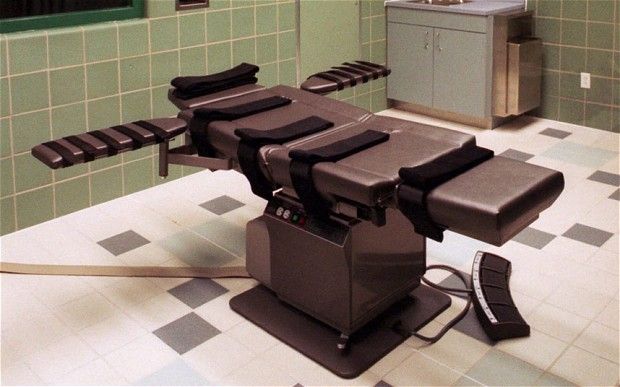SCOTUS denies CA death penalty suit
 The Supreme Court declined to hear a lawsuit intent on overturning California’s death penalty regime on that grounds that it was too slow to be constitutional, drawing a rebuke from just one of their members.
The Supreme Court declined to hear a lawsuit intent on overturning California’s death penalty regime on that grounds that it was too slow to be constitutional, drawing a rebuke from just one of their members.
“The case was brought by Richard D. Boyer, who has cited the stress of his long wait on death row after being sentenced in 1984 for the murders of an elderly couple” in the California city of Fullerton, the New York Times noted. The California Supreme Court had overturned Boyer’s sentence “because of a police error,” as the Los Angeles Times reported, “but he was tried and convicted again and sentenced to death in 1992.”
Justice Steven Breyer filed a fierce dissent. “More California death row inmates had committed suicide than had been executed by the state,” he wrote, according to the Times.
“Indeed, only a small, apparently random set of death row inmates had been executed. Put simply, California’s costly ‘administration of the death penalty’ likely embodies ‘three fundamental defects’ about which I have previously written: (1) serious unreliability, (2) arbitrariness in application and (3) unconscionably long delays that undermine the death penalty’s penological purpose.”
Breyer cited a 2008 report issued by the California Commission on the Fair Administration of Justice that condemned the state’s laborious and ineffective capital punishment regime. It found, The Hill reported, “that more than 10 percent of the capital sentences issued in California since 1978 had been reversed. Many prisoners had died of natural causes before their sentences were carried out and more California death row inmates had committed suicide than had been executed by the state.”
A lone dissenter
Breyer, a well-known opponent of the death penalty, rehearsed arguments he fleshed out recently in another dissent. “Last year, Breyer, joined by Justice Ruth Bader Ginsburg, said he believed capital punishment as practiced in America was unconstitutional because the system has proven to be unreliable and random,” the Los Angeles Times added.
But on this occasion, Ginsburg did not join in Breyer’s dissent. And the court disagreed that the dysfunction Breyer invoked rose to the level of an infringement of Boyer’s constitutional rights — leaving prior rulings the final word on the matter for now. In a similar 1999 case, as the Times recalled, Justice Clarence Thomas doubted the existence of “any support in the American constitutional tradition or in this court’s precedent for the proposition that a defendant can avail himself of the panoply of appellate and collateral procedures and then complain when his execution is delayed.”
Justice deferred
Ironically, Boyer’s suit arose from the fact that executions in California have been exceedingly rare. “The last execution in California took place in 2006, when the state executed 76-year-old Clarence Ray Allen for three counts of first-degree murder,” according to the Washington Post. “Even before the current decade-long hiatus — prompted by concerns over lethal injection protocols — it was still rare for the state to put someone to death. Since 1976, the year the U.S. Supreme Court reinstated the death penalty, California has executed 13 of its death row inmates; Texas, far and away the country’s most active death-penalty state, executed 13 inmates last year alone.”
But California has amassed a backlog of 743 inmates on what is “by far the nation’s biggest death row,” the Los Angeles Times observed. Although the state’s moratorium on executions was lifted in November, as the San Jose Mercury News noted, controversy has already arisen over one high-profile case in which a death row inmate has sought clemency from Gov. Jerry Brown. The inmate, Kevin Cooper, who was sentenced to die on May 15, 1985 and has spent 31 years on death row at San Quentin Prison, “has maintained his innocence since his arrest on July 30, 1983,” according to the paper.
Related Articles
SoCal water reserves could dry up in 2016
The nearby photo shows the recent demolition of a 160-foot water tank tower at Edwards Air Force Base northeast of Lancaster. Could it
CA bag ban initiative heading toward 2016 vote
The effort to repeal the state’s looming prohibition on plastic grocery bags is projected to have enough valid signatures to
California Democrats tar opponents with Trump
California Democrats have centered around a handful of Republican challengers they hope to tar with Donald Trump’s brush. Assemblymen Dante




